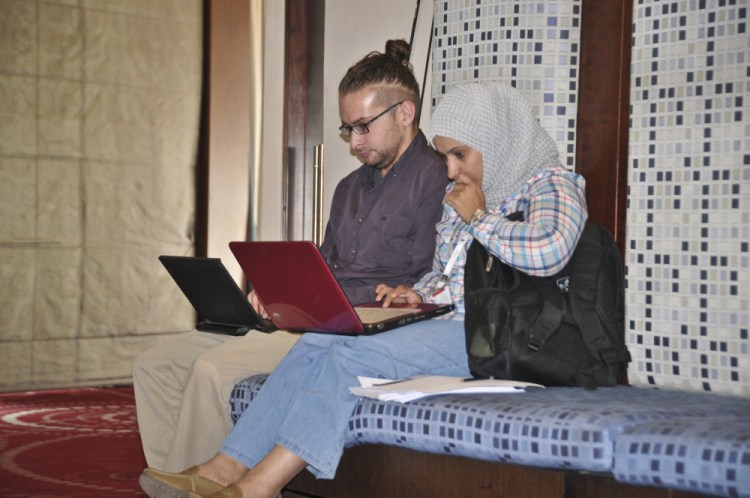Luke Somers, an American who was killed during a rescue attempt against his al-Qaida captors in Yemen, had been working as a freelance photographer and editor in that country, and those who knew him say he had “wanderlust” and was drawn to new experiences.
Lucy Somers told The Associated Press on Saturday that that she learned of her 33-year-old brother’s death from FBI agents. He had been kidnapped in September 2013 in the Yemeni capital of Sanaa.
President Barack Obama said Saturday that he authorized the rescue attempt because the U.S. had information that Somers’ life was in “imminent danger.”
U.S. special forces had tried to rescue Somers last month.
“My life is in danger,” Somers said in video footage, which appeared to mimic hostage videos released by the Islamic State group.
Lucy Somers said her brother had worked tirelessly to raise awareness of people’s plight in Yemen, and improve things with his work.
“Through his photographs we can see the humanity through conflicts, the familiar in a turbulent tribal region,” she said from near London.
Family friend Penny Bearman said he had a sensitivity for people and had become a well-loved and respected member of the local community in Sanaa.
“I think Luke would have wanted issues of extremism and terrorism to be addressed by stepping up the dialogue instead of resorting to conflict between nations.”
Somers, who was born in Britain, earned a bachelor’s degree in creative writing while attending Beloit College in Wisconsin from 2004 through 2007.
“He really wanted to understand the world,” said Shawn Gillen, an English professor and chairman of Beloit College’s journalism program.
Fuad Al Kadas, who said Somers is one of his best friends, said Somers spent time in Egypt before finding work in Yemen. Somers started teaching English at a Yemen school but quickly established himself as a one of the few foreign photographers in the country, he said.
“He is a great man with a kind heart who really loves the Yemeni people and the country,” Al Kadas wrote in an email from Yemen. He said he last saw Somers the day before he was kidnapped.
“He was so dedicated in trying to help change Yemen’s future, to do good things for the people that he didn’t leave the country his entire time here,” Al Kadas wrote.
Al Kadas said in Yemen, Somers enjoyed making friends with neighbors, youth activists and ordinary people.
Gillen said Somers wanted to seek out experiences that would matter to him, noting he traveled to Egypt as part of the school’s study abroad program. The professor said he wasn’t surprised when he heard Somers had moved to Yemen.
“He’d want to be in places where world events were happening,” the professor said, adding that liberal arts instructors want their students “to go on and lead meaningful, purposeful lives. Luke was trying to do that. That makes (his capture) all the more horrible for us to ponder.”
Gillen said Somers was in his advanced non-fiction writing course and a small-group seminar that focused on William Butler Yeats and James Joyce. He said Somers would often stop by his office just to chat.
“He would come by and say, ‘I was walking across campus and I was thinking about something Joyce wrote,’ and he’d want to talk about it. In many ways that’s a professor’s dream come true,” Gillen said.
In a campus letter, Beloit president Scott Beirman described Somers’ death as ”crushing news.” He urged community members to think of ways to honor him.
In 2007, Somers worked as an editor at The Teaching Drum Outdoors School in Three Lakes, Wisconsin. Somers’ family members have ties to Washington state.
Tamarack Song, the school’s director, said Somers was hired to edit a book for the school. He came to the school with his girlfriend who also was an editor.
“He was born in England, raised in America. He had wanderlust.” Song said. “He wanted to know what made people tick. He has an undying curiosity for human dynamics and for the way people worked. He was constantly doing research.”
Song said he thought Yemen and the Middle East was a symbol for Somers, and that Somers wanted to be at the epicenter of culture and ideology.
“He wanted to be in the center of things, and to get a feel for it. To get closer and closer, to interview people, to research, to write, to get right there,” Song said.
Associated Press writers Phuong Le in Seattle, Todd Richmond in Madison, Wisconsin, and Tanja Popovic in London contributed to this report.
Send questions/comments to the editors.



Comments are no longer available on this story